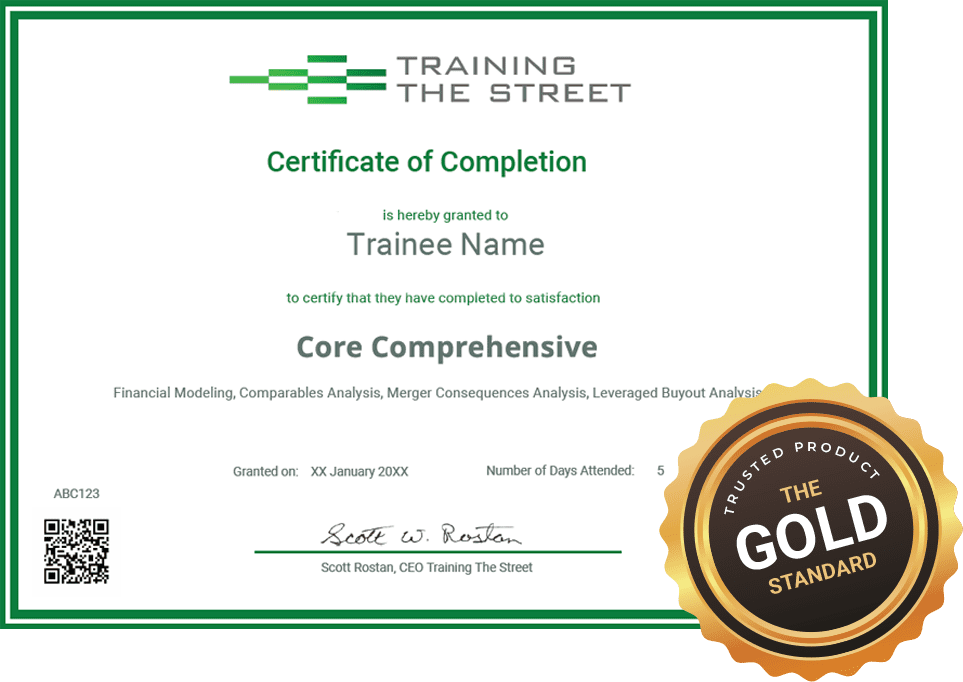
Learn techniques we teach around the world...
Utilizing the same case study based approach delivered for our corporate clients, these courses provide hands-on, real world, practical applications of the standards and methods that a professional needs.
The Enhanced format incorporates robust features that have traditionally only been available to our on-site training clients:
- Accounting Pre-assessment and Adaptive Pre-work
- Our full suite of in-class technology to maximize engagement and learning styles
- Quizzes to make sure that the prior day’s skills are retained and mastered
- After lecture assessments with a dedicated teaching associate to answer questions
Led by our experienced instruction team of former practitioners, you get a unique blend of industry insight combined with a passion for teaching. The average TTS instructor has been part of the team for 8.5 years.
What you will learn?

Public & Acquisition Comparables and Discounted Cash Flow Analysis
Overview of valuation methodologies and fundamental concepts
Public Comparables Analysis:
- Choosing the appropriate peer group
- Gathering public information
- Calculating market and enterprise value
- Normalizing for non-recurring items
- Calculating latest twelve months (LTM)
- Calculating relevant multiples
- Deriving an implied valuation range
- Analyzing multiples and a comparables universe
- Exercise: “Spreading public comparables” for the case company
Overview of Acquisition Comparables Analysis:
- Choosing the appropriate deal list
- How control premiums and synergies impact multiples
- Sources of public information
Discounted Cash Flow Analysis:
- Strengths and considerations of a DCF analysis
- Deriving a weighted average cost of capital (WACC)
- Discounting unlevered free cash flows
- Estimating the terminal value (exit multiple vs. perpetuity growth rate approach)
- Determining the valuation range based on DCF analysis
- Exercise: Adding DCF output to a 3-statement model for the case company
Analyzing Results:
- Imputing valuation ranges
- Analyzing a “Football field” for the case company based on different valuation methodologies
Excel, Financial Modeling & Advanced Sensitivity Analysis
Mastery Quiz: Comparables and DCF
Overview and introduction to financial modeling
Excel Best Practices and Efficiencies
Construction and Application of:
- Core statements
- Working capital schedule
- Depreciation schedule
- Amortization schedule
- Other long-term items schedule
- Equity schedule
- Debt and interest schedule
Troubleshooting the Model:
- Understanding and controlling for circular references
- Balancing the model
- Making the model “deal ready”
Utilizing the Finished Product:
- Data tables
Advanced Sensitivity Analysis:
- Adding scenarios to the model
- Creating a toggle for cases and naming cells
Merger Consequences Analysis
Mastery Quiz: Financial Modeling
- Concept of affordability analysis
- Purchase accounting overview
- Creation of goodwill and write-ups, including possible incremental D&A
- Opening balance sheet and purchase accounting adjustments
- Pro forma income statement
- Accretion/dilution analysis
- Credit rating considerations
- M&A transaction considerations(stock vs. cash, social issues, etc)
- Asset vs. stock purchase
- Tax deductibility of goodwill
- Section 338 election
- Exercise: Building an M&A model for a potential acquisition of the case company
Leveraged Buyout Analysis
Mastery quiz: Merger consequences
- What makes a good LBO candidate?
- Concept of value creation via de-leveraging, operational improvements and “multiple expansion”
- Sources of funding for an LBO
- Differing viewpoints for LBO constituents
- Purchase price determination
- Debt capacity and financing options (Pro rata facilities, institutional facilities, mezzanine capital)
- Sponsors equity and internal rate of return (IRR)
- Fundamentals of “recapitalization accounting”
- Mechanics of constructing an LBO model
- Exercise: Constructing an LBO model for the case company
What Does A Day Look Like?
Who Is This Course For?


Course Details
What’s Included
Schedule
Prerequisites
How Do You Like To Learn?

Flexible Learning Options
Our courses are available in both in-person or virtual classroom formats. If you learn better in your own space or traveling isn’t convenient, virtual is great solution. Either way, you get the skills and support you need to succeed.

Course Pricing
Cancellation Policy
See what our students say

Training The Street has been teaching the biggest finance firms for over 20 years. To help unlock your career potential, we offer certificates to provide the recognition you deserve.
After you finish your course, you will receive a certificate which can be easily added to your LinkedIn profile.




















